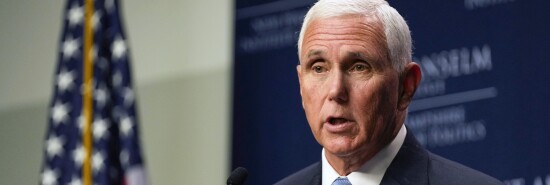
No, Mike Pence, the choice is not between conservatism and populism
Timothy P. Carney
Video Embed
“Republican voters face a choice,” intoned Mike Pence, who cannot speak without intoning. “In the days to come, will we be the party of conservatism, or will we follow the siren song of populism unmoored to conservative principles? The future of this movement and this party belongs to one or the other, not both. That’s because the fundamental divide between these two factions is unbridgeable.”
There’s a lot of parsing we could do here. Pence seems to be contrasting conservatism with populism, but depending on how you interpret his ambiguous wording, he might simply be comparing conservatism to “populism unmoored to conservative principles.”
ROMNEY ACKNOWLEDGES PITCHING MANCHIN ON STARTING THIRD PARTY AHEAD OF 2024
If Pence is doing the latter — saying Republicans should not become unmoored from conservativism — fine, but that’s not interesting, and it renders much of his other intonations meaningless. Conservatism cannot be non-conservatism? Thanks, Socrates.
So if Pence is making any meaningful distinction, he is saying that populism is unconservative. This is a false claim, and it is in fact a dangerous error for a conservative to make.
Conservatism in the 21st century needs to be populist. Conservatism stands for marriage and family, and defends traditional Judeo-Christian sexual morality. Marriage, family, and sexual morality are all under attack by a sliver of elites who are peddling transgenderism to kids and pushing pornography in public school libraries.
One locus of conservatism today is angry parents trying to take their schools back from George Soros-funded ideologues who have hijacked school boards. Politically powerful teachers unions team up with these ideologues — and wherever possible, left-wing state legislators — to try and tear kids away from their parents.
This fundamental fight of 2020s conservatism is a populist fight.
On the economic front, Pence seems to be positioning himself against the nationalist conservatives — populists who advocate industrial policy to help the working man. This, Pence suggests, cuts against conservatives’ “faith in limited government.”
If this is, in fact, Pence’s point, I agree that conservatives should oppose industrial policy. While the populist instinct to preserve or restore working-class jobs is a just one, the conservative disposition advises against giving government the power to pick winners and losers. Industrial policy — expanding subsidies, mandates, taxes, loopholes, and regulations in order to shape the economy through politics — does not end up being populist. It empowers the guys with the best lobbyists, and these days it fuels woke capital.
A different sort of conservative populist economics — what I and others advocated in the Obama years — involves aggressively dismantling the privilege that big business enjoys. Donald Trump’s most conservative economic policy was his cut in individual income tax rates combined with doubling the standard deduction. These changes were resisted by the Realtor lobby and other special interests whose game is selling tax deductions. In other words, Trump’s individual tax cut was populism.
Simplifying the tax code further and cutting rates would be both populist and conservative. Abolishing the Export-Import Bank, the ethanol mandate, the Jones Act, and the sugar program would be both populist and conservative. Pence has been ambivalent on these matters — he often sides with special interests over free markets.
Finally, Pence seems to argue that aggressive and expansive foreign policy is conservative. “The Republican populists would abandon American leadership on the world stage, embracing a posture of appeasement in the face of rising threats to freedom,” he said in New Hampshire.
It’s not clear what “threats to freedom” Pence is referring to, or which conservatives are appeasing whom. Perhaps he is referring to conservatives who resist unlimited support of Ukraine. Regardless, this hardly seems like an apt litmus test of conservatism. What is conservative about unlimited foreign aid, risking nuclear war, and trusting in the power of the U.S. State Department to expertly steer the rest of the world toward freedom?
CLICK HERE TO READ MORE FROM THE WASHINGTON EXAMINER
This unbridgeable divide Pence imagines between populism and conservatism is hard to perceive in real life.
It could be that when Pence uses the word “populism,” he simply means “Donald Trump.” Admittedly, running against Trump would be much harder for Pence than running against a caricature of populism.
